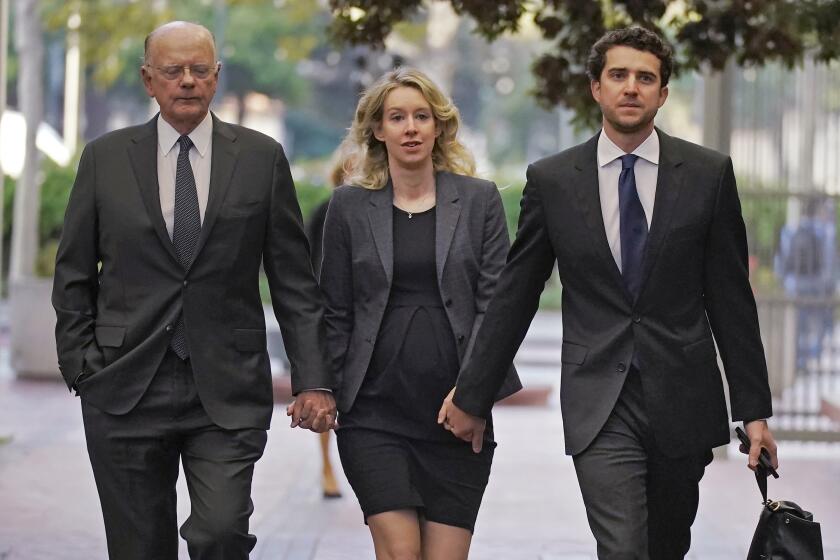Employer Prohibits Staff Fraternization.
- Share via
Q My employer has instituted a new “non-fraternization policy” that forbids managers and supervisors to date or pursue romantic or sexual relationships with employees whom they supervise. Employees who violate this policy will be subject to discipline, including termination.
Does my employer have the right to dictate to its employees who they can and cannot get involved with?
What if an employee happened to be romantically involved with, or even married to, a supervisor before the policy was established?
--L.A., Buena Park
A An employer may not discriminate against an employee because of marital status, and may not have a blanket rule that prohibits spouses from working together.
However, an employer may, under certain circumstances, regulate the relationships between supervisory and subordinate employees.
In California, the general rule is that an employer may prohibit romantic or sexual relationships as long as the employer analyzes each relationship and determines that it poses problems with supervision, security, safety or is detrimental to work force morale. This also applies to relationships that existed before an anti-fraternization policy existed.
Of course, an anti-fraternization rule must be consistently enforced, or the employer could face a claim of discrimination.
If employees were romantically involved or married before the policy took effect, they may have a claim that the employer breached their employment agreement by imposing a new rule. But the claim would be difficult to win.
Many employer handbooks or manuals allow companies to modify employment policies at any time. Even in the absence of such documents, courts are inclined to permit employers to adopt reasonable rules that are designed to promote harmony and efficiency in the workplace.
If you have a particular set of circumstances that concern you, I suggest you contact the Fair Employment and Housing Department, which has adopted regulations on when an employer may and may not prohibit such relationships.
--Diane J. Crumpacker
Employment law attorney
Fried, Bird & Crumpacker
Miss a Deadline, Make a Contribution
Q At the company I work for, I’ve observed some managers requiring individuals to contribute money when they are late to meetings, miss deadlines or in some other way fail to live up to the manager’s expectations.
These contributions are used for group lunches, gift donations, birthday parties, etc.
Is this legal and/or ethical?
--B.C., Long Beach
*
A I think your employer has probably attended too many Rotary Club meetings where such a practice is carried out in a good-natured way to help fund service projects that the members support.
But this practice is not appropriate when managers in a company make it mandatory.
By statute, it is illegal for an employer to require employees to either make purchases from the employer or subsidize losses. In fact, it may even be a criminal violation.
It is also illegal because the money involved has not been accounted for properly and reported to the IRS by the company.
You should check the employee or supervisor handbook to see if it violates the company’s written policies.
There are easier, fairer and more legal ways to accomplish the same result. An employer could simply document the penalties and subtract them from future discretionary raises or bonuses of employees, for example.
As a practical matter, since this practice apparently concerns employees other than you in the company, I would suggest not complaining about it unless you want to face possible retaliation. Even if the practice does affect you, weigh your real financial losses against the possible harm that might result if you complain.
--Don D. Sessions
Employee rights attorney
Mission Viejo
Loss of Unused Days in Accrued Vacation
Q Can an employer eliminate vacation days accrued in a calendar year that are not used during the prescribed time frame established by the employer?
--W.M., El Segundo
*
A An employer generally cannot force employees to forfeit their accrued vacation days simply because the accrued vacation hours are not used within a specified time period.
The rule may not apply if the vacation benefits are funded through a trust under the terms of the Employee Retirement Income Security Act of 1974 (ERISA)--which is very rare--or if the vacation benefits are subject to a collective bargaining agreement.
--Kirk F. Maldonado
Employee benefits attorney
Riordan & McKinzie
After Job Interview, a Follow-Up Letter?
Q I have been interviewing for a number of jobs. Should a prospective employment candidate send a follow-up letter after an interview? Do they truly make a difference in hiring or not hiring a person?
--J.B., Anaheim
*
A A follow-up letter thanking a prospective employer for the interview is a good idea. It is good business etiquette and may help you to “stand out” from the other applicants.
You also can use a follow-up letter to include any pertinent information that you may not have conveyed during the interview.
As with all correspondence with prospective employers, maintain professionalism. A hasty or poorly written follow-up letter may reflect poorly on you.
--Ron Riggio, director
Kravis Leadership Institute
Claremont McKenna College
If you have a question about an on-the-job situation, please mail it to Shop Talk, Los Angeles Times, P.O. Box 2008, Costa Mesa, CA 92626; dictate it to (714) 966-7873; or, e-mail it to [email protected]. Include your initials and hometown. The Shop Talk column is designed to answer questions of general interest. It should not be construed as legal advice.
More to Read
Inside the business of entertainment
The Wide Shot brings you news, analysis and insights on everything from streaming wars to production — and what it all means for the future.
You may occasionally receive promotional content from the Los Angeles Times.










